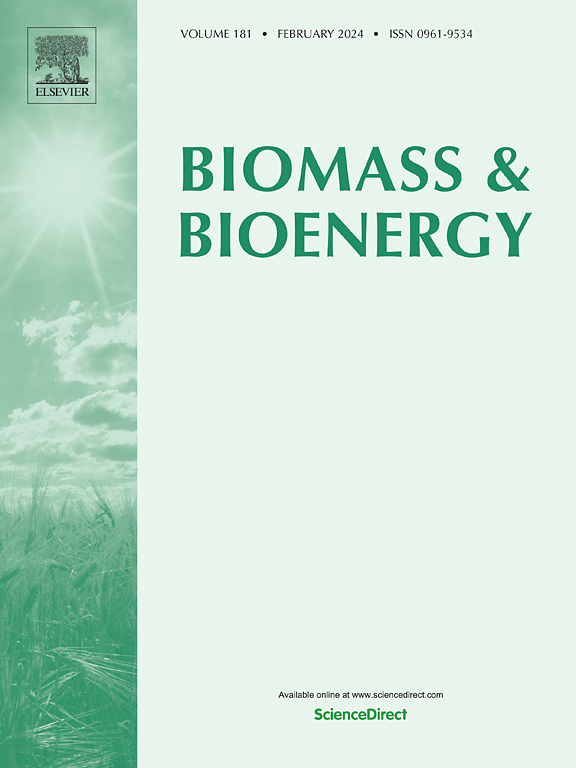沼气利用--运输生物甲烷使能技术的生命周期评估--英国案例研究,Bore Hill 农场生物发酵罐
IF 5.8
2区 生物学
Q1 AGRICULTURAL ENGINEERING
引用次数: 0
摘要
英国已实施和正在考虑实施的政策提倡使用厌氧发醇(AD)产生的沼气;然而,中小型厌氧发醇厂(英国大多数厌氧发醇厂)几乎无法接入能源分配网络。将生物甲烷(升级后的沼气)用于运输的机会得到了可再生运输燃料义务(RTFO)的奖励,为厌氧消化(AD)工厂提供了实现生物质战略中规定的生物甲烷目标的最低成本途径。在这项研究中,生命周期评估被用来证明将生物甲烷用于运输的环境效益(考虑到全球变暖潜能值和化石燃料稀缺的影响),并与沼气发电方案(在无法使用天然气电网的情况下)进行比较。研究结果表明,生物甲烷方案在选定的影响类别中具有显著的环境优势,证明生物甲烷用于运输可使厌氧发酵工业脱碳,并有助于实现英国的 "净零 "目标。生物甲烷方案在捕获生物源二氧化碳方面具有更大的潜力。然而,沼气升级技术在技术和经济上都在不断发展,应通过技术经济评估进一步研究其在厌氧消化(AD)操作中的适当规模和应用。本研究有助于英国厌氧消化(AD)行业和关注未来沼气-生物甲烷脱碳路线的政策制定者。本文章由计算机程序翻译,如有差异,请以英文原文为准。
Biogas utilisation – Life cycle assessment of enabling technology for transport biomethane - UK case study, Bore Hill farm Biodigester
Policies, implemented and being considered in the UK, promote the use of biogas from anaerobic digestion (AD); however, small-medium scale AD plants, the majority of the UK's AD plants, have little access to energy distribution networks. The opportunity for using biomethane (upgraded biogas) for transportation, is rewarded in the Renewable Transport Fuels Obligation (RTFO), offering the AD plants the lowest cost route to achieving the targets set out in the Biomass Strategy for biomethane. In this study, Life Cycle Assessment is used to demonstrate the environmental benefits of using biomethane for transportation (considering global warming potential and fossil fuel scarcity impacts), compared to a biogas-to-electricity scenario, where the gas grid is not accessible. The results show that biomethane scenarios have significant environmental advantages in selected impact categories, evidencing that biomethane for transportation can decarbonise AD industries and contribute to the Net Zero target in the UK. Biomethane scenarios show greater potential for capturing biogenic CO2. However, biogas upgrading technologies, evolving technically and economically, should be studied further through techno-economic assessments for the appropriate scale and application in AD operations. This study contributes to the UK AD industry and policy makers concerned with the decarbonisation of biogas-to-biomethane routes for the future.
求助全文
通过发布文献求助,成功后即可免费获取论文全文。
去求助
来源期刊

Biomass & Bioenergy
工程技术-能源与燃料
CiteScore
11.50
自引率
3.30%
发文量
258
审稿时长
60 days
期刊介绍:
Biomass & Bioenergy is an international journal publishing original research papers and short communications, review articles and case studies on biological resources, chemical and biological processes, and biomass products for new renewable sources of energy and materials.
The scope of the journal extends to the environmental, management and economic aspects of biomass and bioenergy.
Key areas covered by the journal:
• Biomass: sources, energy crop production processes, genetic improvements, composition. Please note that research on these biomass subjects must be linked directly to bioenergy generation.
• Biological Residues: residues/rests from agricultural production, forestry and plantations (palm, sugar etc), processing industries, and municipal sources (MSW). Papers on the use of biomass residues through innovative processes/technological novelty and/or consideration of feedstock/system sustainability (or unsustainability) are welcomed. However waste treatment processes and pollution control or mitigation which are only tangentially related to bioenergy are not in the scope of the journal, as they are more suited to publications in the environmental arena. Papers that describe conventional waste streams (ie well described in existing literature) that do not empirically address ''new'' added value from the process are not suitable for submission to the journal.
• Bioenergy Processes: fermentations, thermochemical conversions, liquid and gaseous fuels, and petrochemical substitutes
• Bioenergy Utilization: direct combustion, gasification, electricity production, chemical processes, and by-product remediation
• Biomass and the Environment: carbon cycle, the net energy efficiency of bioenergy systems, assessment of sustainability, and biodiversity issues.
 求助内容:
求助内容: 应助结果提醒方式:
应助结果提醒方式:


